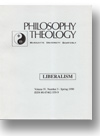|
articles |
|
1.
|
Philosophy and Theology:
Volume >
4 >
Issue: 3
Stuart D. Warner
The Politics of the Book:
The French Revolution and the Demise of Natural Rights Theory
abstract |
view |
rights & permissions
| cited by
The principal object of Ihis essay is to elucidate some of the story of how a theory that was so entrenched in the minds of intellectuals, namely, natural rights theory, fell so out of favor. This is the story of how the terror, fear, and destruction that became part of the French Revolution was laid at the feet of natural rights theory by three powerful figures: Burke, Bentham, and Hegel. It was these three figures, more than any others, who were responsible for the demise of natural rights theory in the nineteenth century; and their respective criticisms of natural rights theory were made under the omnipresent shadow of, and in response to, the French Revolulion.
|
|
|
|
|
2.
|
Philosophy and Theology:
Volume >
4 >
Issue: 3
Tibor R. Machan
Natural Rights Liberalism
abstract |
view |
rights & permissions
| cited by
Classical Iiberalism has at least two distinct strains. Its natural rights version requires extensive use of moral concepts. Some denigrate this tradition on grounds that it has been made obsolete by empiricist epistemology and materialist metaphysics. Since that tradition requires knowledge of moral truth and since empiricism precludes this, the tradition is hopeless. Since it also requires a teleological explanation of human action, and since mechanism precludes this, the hopelessness of the tradition is compounded. I argue that neither the empiricist nor the mechanistic view may be taken for granted - indeed, if anything, they are obsolete, and the road is open to a philosophy which makes the natural rights tradition even more credible than it was when developed by John Locke.
|
|
|
|
|
3.
|
Philosophy and Theology:
Volume >
4 >
Issue: 3
Timothy Fuller
The Theological-Political Tension in Liberalism
abstract |
view |
rights & permissions
| cited by
The tension ia liberal political theory between religious commitment and poIitical citizenship is examined first within the framework or Rousseau’s political theory, and secondly within the context of Hegel’s account of the stale. I conclude with some reflections upon the tension as it occurs among contemporary political theorists.
|
|
|
|
|
4.
|
Philosophy and Theology:
Volume >
4 >
Issue: 3
Nicholas Capaldi
Liberal Values vs. Liberal Social Philosophy
abstract |
view |
rights & permissions
| cited by
This paper is a contribution toward the clarification of the meaning and evolution of liberalism. Liberal values are distinguished from liberal social philosophy. Liberal values, specifically individuality, government by consent of the governed, and private property in a capitalist economy are modern despite their clear classical and medieval origins. Liberal social philosophy consists of ontological realism, epistemological individualism, and axiological teleology. Liberal social philosophy is classical, and it reflects an attempt to rationalize modern values with a classical philosophy. I argue that liberal social philosophy is seriously flawed, and when it is modified for modern contexts it is inimical to liberal values. Liberal values are better understood and more defensible, as well as more compatible with nonliberal values, when divorced from liberal social philosophy.
|
|
|
|
|
5.
|
Philosophy and Theology:
Volume >
4 >
Issue: 3
Loren E. Lomasky
Liberal Autonomy
abstract |
view |
rights & permissions
| cited by
Theorists increasingly tum to autonomy (rather than liberty per se) as a grounding value for liberalism. This is, I argue, an iII-advised strategy. If autonomy is understood to differ from (negative) liberty insofar as it demands from agents significantly greater feats of self-determination, then it is not clear that autonomy is worth having. And, irrespective of whether autonomy is judged to be valuable, autonomy-based liberalisms eilher prescribe essentially the same constraints as classical liberalism - and thus are poIitically innocuous - or else require that the stale act non-neutrally with respect to its citizens - and thus are illiberal.
|
|
|
|
|
6.
|
Philosophy and Theology:
Volume >
4 >
Issue: 3
Douglas Den Uyl
Editor’s Introduction
view |
rights & permissions
| cited by
|
|
|
|





